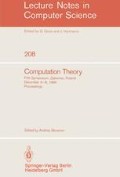Abstract
In this paper we consider a 2-dimensional array acceptor, called Turing array machine /TAM/, which is a generalization of k-tape Turing machine for string languages. By means of this automaton the complexity classes of array languages are defined. For 2-dimension array languages a generalization of log-space reducibility relation is introduced so that every language which is NL-complete is also complete for the class of array languages accepted by TAMs in log space. It is also shown that there exists array language over 1-letter alphabet which is complete for the class of array languages accepted by nondeterministic TAMs in log space. It turned out that when proving equality or inequality of the classes NL and L we face the same difficulties when proving this property for array counterparts of the above classes. At the end we introduce an array language, called projection accessibility problem /PAP/, over 1-letter alphabet, which is log-space complete and is accepted by some nondeterministic finite automaton. It follows, that if there exists any deterministic automaton with a finite number of pebbles which accepts PAP then NL=L.
Preview
Unable to display preview. Download preview PDF.
References
Blum,M.,Hewitt,C., Automata on 2-dimensional tape, Proc. 8th IEEE Symp. on Switching Theory,1967,pp. 155–160
Cook, C.,R.,Wang, P.,S.,P., A Chomsky hierarchy of isotonic array grammars and languages, Comput. Graphics and Image Processing 8, 1978, 144–152
Ejsmont, M., Problems in labyrinths decidable by pebble automata, Elektron. Informationsverarb. u. Kybernet. 20,1984,623–632
Ejsmont,M., Array languages acceptable in logarithmic space, in polish, Ph.D. dissertation, University of Gdańsk, Institute of Mathematics,1985
Hartmanis,J., Feasible Computations and Provable Complexity Properties, CBMS-NSF Regional Conference Series in Applied Mathematics 30,1978, SIAM Monograph
Jones, N.,D., Space bounded reducibility among combinatorial problems, J. Comput. System Sci. 11, 1975,62–85
Computer interpretation of english text and picture patterns, IEEE Trans. Comput. EC-14, 1964,363–376
Miligram, D.,L.,Rosenfeld, A., Array automata and array grammars, Information Processing 71, pp.69–74, North-Holland, Amsterdam, 1972
Mylopoulos, J., On the recognition of topological invariants by 4-way finite automata, Comput. Graphics and Image Processing 1, 1972,308–316
Rosenfeld, A., Isotonic grammars, parallel grammars and picture grammars, Machine Intelligence 6, pp.281–294, American Elsevier, New York, 1971
Rosenfeld, A., Some notes on finite-state picture languages, Inform. Control 31,1976,177–184
Author information
Authors and Affiliations
Editor information
Rights and permissions
Copyright information
© 1985 Springer-Verlag Berlin Heidelberg
About this paper
Cite this paper
Ejsmont, M. (1985). On the log-space reducibility among array languages /preliminary version/. In: Skowron, A. (eds) Computation Theory. SCT 1984. Lecture Notes in Computer Science, vol 208. Springer, Berlin, Heidelberg. https://doi.org/10.1007/3-540-16066-3_8
Download citation
DOI: https://doi.org/10.1007/3-540-16066-3_8
Published:
Publisher Name: Springer, Berlin, Heidelberg
Print ISBN: 978-3-540-16066-3
Online ISBN: 978-3-540-39748-9
eBook Packages: Springer Book Archive

